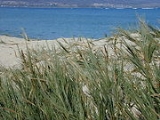
Sporobolus virginicus
Encyclopedia
Sporobolus virginicus, known by numerous common names including Marine Couch, Sand Couch, Coastal Rat-tail Grass, Salt Couch Grass, Saltwater Couch and Nioaka, is a coastal non-bunching tussock grass with a wide distribution.
grass from 10 to 50 centimetres in height. Its flowers are green or purple. It reproduces asexually by use of both stolon
s and rhizome
s.
by Karl Sigismund Kunth in 1829. It has a great many synonyms.
, New Zealand
, Pacific Islands
, the Caribbean
, Africa
, India
, China
and Indonesia
. It is widespread in Australia, occurring in every state, although in New South Wales
it is considered naturalised
.
Description
It is a perennial tussockTussock
Tussock most often refers to a small hillock of grassy, or grass-like plant growth, but may also refer to Plants and ecology, Insects.- Plants and ecology :*Tussock *New Zealand tussock grasslands*Serrated Tussock...
grass from 10 to 50 centimetres in height. Its flowers are green or purple. It reproduces asexually by use of both stolon
Stolon
In biology, stolons are horizontal connections between organisms. They may be part of the organism, or of its skeleton; typically, animal stolons are external skeletons.-In botany:...
s and rhizome
Rhizome
In botany and dendrology, a rhizome is a characteristically horizontal stem of a plant that is usually found underground, often sending out roots and shoots from its nodes...
s.
Taxonomy
It was originally published by Carl Linnaeus in 1753, under the name Agrostis virginicus. It was transferred into SporobolusSporobolus
Sporobolus is a genus of grasses in the family Poaceae. They are usually called dropseed grasses or sacaton grasses. They are typical prairie and savanna plants, and they occur in other types of open habitat in warmer climates....
by Karl Sigismund Kunth in 1829. It has a great many synonyms.
Distribution and habitat
It grows in AustraliaAustralia
Australia , officially the Commonwealth of Australia, is a country in the Southern Hemisphere comprising the mainland of the Australian continent, the island of Tasmania, and numerous smaller islands in the Indian and Pacific Oceans. It is the world's sixth-largest country by total area...
, New Zealand
New Zealand
New Zealand is an island country in the south-western Pacific Ocean comprising two main landmasses and numerous smaller islands. The country is situated some east of Australia across the Tasman Sea, and roughly south of the Pacific island nations of New Caledonia, Fiji, and Tonga...
, Pacific Islands
Pacific Islands
The Pacific Islands comprise 20,000 to 30,000 islands in the Pacific Ocean. The islands are also sometimes collectively called Oceania, although Oceania is sometimes defined as also including Australasia and the Malay Archipelago....
, the Caribbean
Caribbean
The Caribbean is a crescent-shaped group of islands more than 2,000 miles long separating the Gulf of Mexico and the Caribbean Sea, to the west and south, from the Atlantic Ocean, to the east and north...
, Africa
Africa
Africa is the world's second largest and second most populous continent, after Asia. At about 30.2 million km² including adjacent islands, it covers 6% of the Earth's total surface area and 20.4% of the total land area...
, India
India
India , officially the Republic of India , is a country in South Asia. It is the seventh-largest country by geographical area, the second-most populous country with over 1.2 billion people, and the most populous democracy in the world...
, China
China
Chinese civilization may refer to:* China for more general discussion of the country.* Chinese culture* Greater China, the transnational community of ethnic Chinese.* History of China* Sinosphere, the area historically affected by Chinese culture...
and Indonesia
Indonesia
Indonesia , officially the Republic of Indonesia , is a country in Southeast Asia and Oceania. Indonesia is an archipelago comprising approximately 13,000 islands. It has 33 provinces with over 238 million people, and is the world's fourth most populous country. Indonesia is a republic, with an...
. It is widespread in Australia, occurring in every state, although in New South Wales
New South Wales
New South Wales is a state of :Australia, located in the east of the country. It is bordered by Queensland, Victoria and South Australia to the north, south and west respectively. To the east, the state is bordered by the Tasman Sea, which forms part of the Pacific Ocean. New South Wales...
it is considered naturalised
Naturalisation (biology)
In biology, naturalisation is any process by which a non-native organism spreads into the wild and its reproduction is sufficient to maintain its population. Such populations are said to be naturalised....
.

